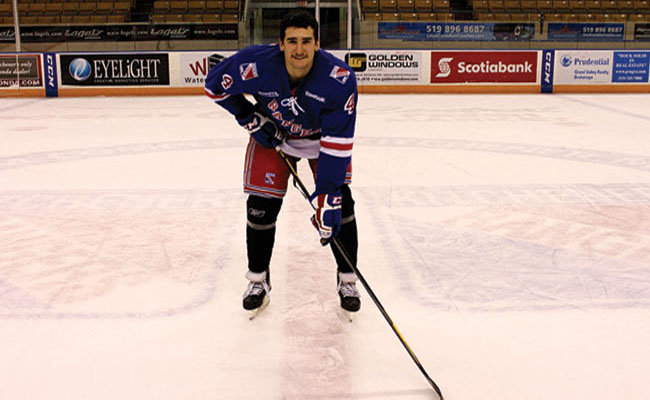
By ANDREW OMRAN
Perseverance, determination and a single dream is what it took for Ben Fanelli to make his remarkable return to hockey following an on-ice injury that nearly ended his life.
In a game in October 2009 at the Aud, a gruesome collision took place that silenced over 6,000 fans when Mike Liambas of the Erie Otters hit Fanelli into the boards, causing him to be knocked unconscious.
Fanelli was airlifted to hospital in Hamilton; he had a fractured skull, a fractured orbital bone and required a breathing tube.
The Kitchener Rangers defenceman returned to the ice this season and is also the poster boy for brain injury awareness across the Ontario Hockey League. He is trying to raise money for a cause that has been a big part of his life.
“I wanted to figure out a way that I could help other people get the same blessing or opportunity,” he said. “I approached the team with an idea, just something I would do personally, on my own, and they decided that they’d jump on board and help me out with it and now it’s turned into something great.”
A foundation called Head Strong is what Fanelli, along with the assistance of Rangers’ management, came up with to spread awareness about brain injuries.
Head Strong has been entered in the Aviva Community Fund challenge, in an effort to receive $35,000 from the bursary program but in order to receive the funding, Head Strong must receive enough votes to move forward to the final round of judging so Fanelli is urging people to vote.
“It’s really important to me and it’s important to a lot of people in the Brain Injury Association of Canada because that’s where the program’s run through and hopefully we can win it … there’s 90 other programs we’re competing with and we’re hoping that we can spread the word and get lots of people voting.”
Teammate Ryan Murphy and former teammate Gabriel Landeskog, who has now been drafted into the National Hockey League, have helped Fanelli train both physically and mentally to come back to where he was before the incident.
“Everyone on the team was really supportive through the past years when I haven’t been playing but I guess those two guys were a little bit closer than the other guys,” said Fanelli. “We got even closer the past two years,” he said. “Supporting me with training and just keeping me happy with me not playing hockey, which was pretty tough at times, so they were always there to help me out and help me with Head Strong which was even better.”
Fanelli hasn’t overlooked the support of the fans as he received countless letters from people who were praying for his recovery.
“I think if that support wasn’t there, I wouldn’t have returned to play so if I could go back and thank every fan out there, everyone that sent me letters, everyone that supported me, I would thank them individually. It’s unbelievable.”
But it was his No. 1 fan who was with him from the beginning and to whom taking care of the 18-year-old was nothing new; his mother.
“I can’t figure out how she managed to find the happy medium between hating the sport of hockey and finding a way for me to play hockey again. For her to support me, it’s unbelievable, and I love her so much for it. It’s crazy. Now she’s at all the games so it’s even better,” he said.
The extraordinary comeback has been compared to that of Lance Armstrong but you won’t hear Fanelli comparing the two.
“I am absolutely honoured because that’s my utmost idol … and that’s who inspired me. That’s who I looked at for inspiration during my comeback and that’s an honour but I think his is miles ahead of mine, I mean he went through something, I believe, a lot more drastic than I did; a disease not many people can overcome the way he did.”
Whatever the future holds for Fanelli, may it be in professional hockey or not, he just wants to be treated like every other player.
“I don’t want anything extra for what happened to me; I want to be treated just like everyone else out here trying to play pro hockey, and that’s the end goal and it will be for the rest of my career.”
Headshots have been a huge part of hockey recently and the issue has sparked a major debate. Given Fanelli’s experience, he has an opinion but has no intention of lobbying for any rule changes.
“There’s more focus on headshots now in hockey and mainly, the most important part to me is how we deal with them and making sure kids are getting the right attention and doing the proper things to make sure they heal 100 per cent. I guess right there, that’s the thing … taking care of the head injuries,” he said.
When it comes to the future of Head Strong, Fanelli believes it is bright.
“It’s really taken off in the past year and people are supporting it more and more and it’s unbelievable to see. I’m hoping it continues to and I’m thinking it will due to the fact that brain injuries are also starting to get a little more attention because of sport and because of all the things we still have to learn about the brain.”

